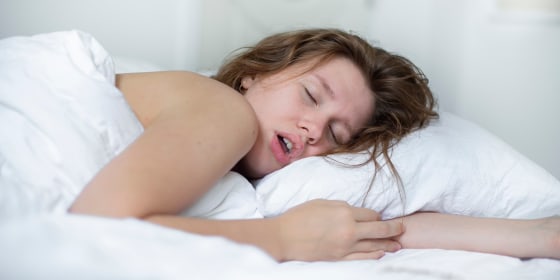We don’t always have the answers, but we have some people on speed dial who do — which is why we present to you our series FYI where we have experts explain if lip balm is actually bad, how often should you wash your hair and more.
When it comes to sleep, there are two types of people — those who snore and those who tries to sleep next to someone who snores. Snoring can often happen to mouthbreathers, which can result in certain health consequences. “It can dry out the mouth, leading to oral health issues like cavities, gum inflammation, and bad breath,” says Dr. Rafael Boruchov, a dentist with two practices in New York City. “It can also result in a decrease in the quality of sleep by contributing to snoring, sleep apnea or interruptions in breathing patterns, all of which can prevent restful sleep.”
One possible solution is mouth taping, which involves tapping your mouth shut so you’re forced to breathe through your nose. But is that safe, and does it actually work? To answer those questions, we spoke to two dentists—here’s what they had to say.
SKIP AHEAD What is mouth taping? | What are the benefits of mouth taping? | Is mouth taping safe? | How to use mouth tape | Mouth tape to use
What is mouth taping?
As mentioned, mouth taping is a technique where a person places a piece of tape over their lips before going to sleep to encourage nasal breathing, says Boruchov. “The idea is to prevent breathing through the mouth during sleep, which can improve oral and overall health.” If you think this means you slap duct tape over your mouth, think again. Experts suggest using gentle, medical-grade tape to prevent irritation and pain when taking it off.
But why is breathing through your nose so much better anyway? Nasal breathing encourages better oxygen flow and can reduce the risk of snoring and other sleep disturbances, therefore improving overall sleep quality, says Boruchov. Conversely, breathing through your mouth can cause dry mouth and throat, leading to discomfort and an increased risk of tooth decay and gum disease, says Dr. Vishala Patel, a dentist at Edge Dental Designs. “Open-mouth breathing is also linked to sleep disorders like obstructive sleep apnea since the airway is being less effectively managed.”
What are the benefits of mouth taping?
Now that you understand the negative effects of mouth breathing while you sleep, it’s easy to see how one may benefit from mouth taping. Boruchov and Patel say those benefits include:
- Promoting nose breathing
- Reducing the risk of cavities and gum disease
- Filtering and humidifying the air you breathe in
- Increasing oxygen intake while you sleep
- Preventing snoring
- Improving overall sleep quality
Is mouth taping safe?
Mouth taping is not without risks and our experts suggest that you consult with a medical professional before trying it out for yourself. Though it’s generally considered safe, those who struggle to breathe through their nose — due to a deviated septum, allergies, sinus issues or congestion — are probably not good candidates to try it.
If mouth taping is not for you, there are other options you can try. “Some safe alternatives to mouth taping include using nasal strips or a nasal dilator to open up your nasal passages and make breathing through your nose easier,” says Boruchov. “Practicing good sleep hygiene, such as elevating your head or maintaining good posture during the day, can also improve nasal breathing.” Finally, Boruchov notes that in some cases, addressing underlying causes like allergies or sinus issues with a doctor can help avoid the need for mouth taping altogether.
How to use mouth tape
If you want to try mouth taping, it’s a fairly easy endeavor. The first thing you’ll have to do is get some tape — you’ll want to pick something that will feel secure but isn’t too grippy. “The best type of tape for mouth taping is hypoallergenic, medical-grade tape that is gentle on the skin, such as micropore tape or a specialized mouth tape designed for sleep,” says Boruchov. “These tapes are typically easy to remove and won’t cause irritation.”
Before applying the tape, make sure your face is totally dry. With this in mind, you’ll want to wait a bit after your evening skin care routine to ensure everything has been absorbed and there is no slickness. From there, apply a small strip across the lips just before going to bed. It’s important to tape only the center of your lips, leaving room for breathing — and always make sure you can remove the tape easily if necessary, says Boruchov.
Another thing to know: It may take a while to wear mouth tape at night. “Start gradually,” says Patel. “Try it for short periods to see how your body reacts.” You may have pulled the tape too tight over your lips if it feels uncomfortable. “You want to place it gently, not pulling or restricting anything,” Patel adds. And, if you feel any discomfort, remember that you can always remove it.
5 highly rated tapes to use for mouth taping
Meet our experts
At NBC Select, we work with experts with specialized knowledge and authority based on relevant training and experience. We also ensure all expert advice and recommendations are made independently and without undisclosed financial conflicts of interest.
- Dr. Rafael Boruchov is a dentist with two practices in New York City.
- Dr. Vishala Patel is a dentist at Edge Dental Designs in Mckinney, Texas.
Why trust NBC Select?
Bethany Heitman is a contributor at NBC Select and a journalist who regularly covers beauty, home and lifestyle. For this story, she interviewed experts on whether or not mouth taping is safe.
Catch up on NBC Select’s in-depth coverage of personal finance, tech and tools, wellness and more, and follow us on Facebook, Instagram, Twitter and TikTok to stay up to date.







